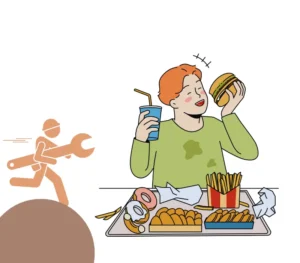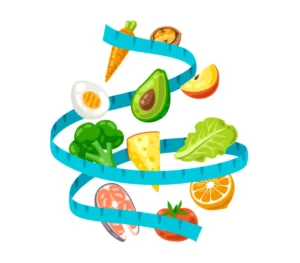Understand a weight loss plan’s essential dos and don’ts to ensure sustainable and healthy results. Create a balanced approach for lasting success, avoid common mistakes, and stay motivated throughout your weight loss journey.
Thank you for reading this post, don't forget to subscribe!What You Need to Know: Dos and Don’ts of a Weight Loss Plan

Embarking on a weight loss journey can feel like navigating a maze with endless options. With so many diets, plans, and tips available, how do you know which will deliver sustainable results? Successful weight loss isn’t about quick fixes or extreme diets—it’s about creating a plan that fits your lifestyle and promotes lasting, healthy changes.
We’ll break down the dos and don’ts to help you choose the right weight loss plan for your goals. Whether you’re just starting or need a plan refresh, these tips will set you on the path to lasting success!
Choosing the right weight loss plan can be daunting. With so many diets, trends, and programs available, it’s easy to feel overwhelmed. But here’s the good news: the best way to achieve lasting results isn’t by jumping on the latest fad diet or making extreme changes. Instead, it’s about making sustainable, well-informed choices that fit your body and lifestyle. This article will explore the essential dos and don’ts when choosing a weight loss plan to ensure success and lasting results.
Do: Set Realistic and Achievable Goals
Setting clear, realistic goals is one of the most essential steps in any weight loss journey. You may want to shed 30 pounds monthly, but is that realistic or healthy? Break down your goals into smaller, achievable milestones to set yourself up for success.
For example, instead of focusing solely on the number on the scale, aim to lose 1-2 pounds a week. It ensures that your weight loss is sustainable and healthy. Breaking larger goals into smaller, actionable steps also helps you stay motivated as you hit each milestone.
Don’t: Follow Extreme or Fad Diets
While extreme or fad diets might promise rapid results, they often come with serious downsides. These diets can deprive your body of essential nutrients, leading to fatigue, mood swings, and even muscle loss. Plus, once you stop the diet, the weight often returns, sometimes even more.
Extreme calorie restriction, elimination diets, or “miracle” supplements may seem tempting, but they aren’t sustainable in the long term. Instead, focus on balanced eating and lifestyle changes. Sustainable weight loss takes time, so be patient and trust the process.
Do: Consult with a Professional (Dietitian/Trainer)
When choosing a weight loss plan, getting advice from professionals who can tailor a plan to your specific needs is crucial. A nutritionist can help you create a balanced eating plan based on your goals, preferences, and health conditions. A personal trainer can guide you on how to incorporate exercise safely and effectively.
Professionals can also help you avoid common mistakes, and they can ensure your plan is balanced, safe, and optimized for your success.
Don’t: Ignore Mental Health and Emotional Well-being
Losing weight isn’t just about what you eat or how much you exercise—it’s also about how you feel mentally. Emotional eating, stress, and anxiety can all sabotage your weight loss efforts. Stress releases cortisol, encouraging fat storage, especially around the belly.
Addressing mental health is crucial to your weight loss plan. Incorporate stress management techniques such as mindfulness, meditation, or yoga. If emotional eating is an issue, consider seeking support from a therapist or counselor to work through the root causes.
Do: Incorporate Regular Physical Activity
While diet plays a significant role in weight loss, exercise is equally important. It helps burn calories, builds muscle, boosts metabolism, and improves overall health. Aim to incorporate both cardio and strength training into your routine. Cardio, like walking, running, or cycling, burns fat, while strength training helps preserve muscle mass.
Exercise doesn’t have to be complicated. Find activities you enjoy so you’re more likely to stick with them. Whether dancing, swimming, or weightlifting, any form of physical activity will support your weight-loss efforts and improve your health.
Don’t: Rely on Supplements or Quick Fixes
Countless weight loss supplements are on the market, but most offer empty promises. Many supplements claim to speed up fat loss or suppress hunger, but their effects are often temporary and don’t address the root cause of weight gain.
Instead of relying on supplements or quick fixes, focus on making long-term lifestyle changes. Actual weight loss comes from healthy eating, regular exercise, and patience. No pill or powder will substitute for a balanced approach.
Do: Focus on a Balanced Diet

A healthy, balanced diet is the cornerstone of any effective weight loss plan. Aim to include a variety of nutrient-dense foods: lean proteins, healthy fats, fiber-rich vegetables, and whole grains. Each macronutrient (protein, fat, and carbs) is essential in weight loss.
Protein helps build and maintain muscle, fat supports hormone regulation, and carbohydrates fuel your body’s energy needs. Avoid overly processed foods, which are high in sugar and unhealthy fats and hinder your progress.
Don’t: Skip Meals or Starve Yourself
Skipping meals or drastically cutting calories can backfire. Skipping meals can slow your metabolism and trigger binge eating later in the day. Starving yourself also depletes your energy, making it harder to stay active and focused.
Instead, eat regular, balanced meals and snacks throughout the day to keep your metabolism running efficiently. Healthy snacks like nuts, fruits, or yogurt can help curb hunger between meals.
Do: Practice Consistency Over Perfection
It’s easy to get caught up in trying to be perfect, but consistency is more important. Don’t beat yourself up if you have a slip-up or indulge in a treat. The key to long-term success is getting back on track and staying consistent with your healthy habits.
Focus on steady progress, and your efforts will pay off over time. A sustainable weight loss plan involves making small, permanent changes you can maintain for life.
Don’t: Compare Yourself to Others
Weight loss is a personal journey, and everyone’s path is different. While it’s natural to want to compare yourself to others, it can lead to frustration and self-doubt. Instead, focus on your progress and celebrate your achievements.
Remember, someone else’s success doesn’t diminish your own. Stay focused on your goals, and trust that your hard work will eventually pay off.
Do: Track Your Progress Regularly
Tracking your progress can keep you motivated and help you identify areas for improvement. Whether it’s through taking weekly measurements, tracking your weight, or noting how your clothes fit, monitoring your progress gives you tangible evidence of your hard work.
Use apps or journals to track your meals, exercise, and mood. It will allow you to see patterns and make adjustments if needed.
Don’t: Get Discouraged by Setbacks
Everyone faces setbacks in their weight loss journey. Whether it’s hitting a plateau or experiencing a period of indulgence, setbacks don’t mean failure. They’re simply part of the process.
When you face challenges, remember that weight loss is a marathon, not a sprint. Keep pushing forward and stay positive. Persistence is the key to overcoming obstacles and continuing your progress.
Do: Stay Hydrated
Water is crucial to weight loss. It keeps you hydrated and supports digestion, metabolism, and fat-burning. Sometimes, thirst is mistaken for hunger, leading to overeating.
Aim to drink at least eight glasses of water daily, and more if you’re physically active. You can also hydrate with herbal teas or water infused with fruits for added flavor.
Effective Weight Loss Pro Plan for a Healthier You
An effective weight loss pro plan is more than just cutting calories or following a trend; it’s about creating a sustainable approach that works for your body and lifestyle. The key to a successful plan is balance.
A healthy weight loss strategy includes proper nutrition, regular exercise, and mental well-being. Start by focusing on a nutrient-dense diet rich in whole foods like lean proteins, fresh vegetables, healthy fats, and whole grains.

Avoid overly processed foods high in sugar and unhealthy fats, as they can hinder your progress and lead to cravings. Incorporating regular exercise—such as a mix of cardio and strength training—helps burn fat, build muscle, and boost metabolism. Consistency is vital; setting small, achievable goals helps maintain motivation while tracking your progress.
In addition to diet and exercise, mental health is crucial for long-term weight loss success. Stress, lack of sleep, and emotional eating can sabotage your efforts, so finding ways to manage these challenges is essential. Mindfulness practices like meditation or yoga can help reduce stress while setting realistic, non-restrictive goals that ensure you’re not overwhelmed by the process.
A pro weight loss plan encourages hydration, proper sleep, and self-care, significantly impacting metabolism and overall health. Remember, the goal is not just to lose weight quickly but to adopt habits that lead to a healthier, happier, and more balanced life in the long run.
Conclusion
In conclusion, creating a successful weight loss plan requires a balanced approach. Following these dos and don’ts can help you build a sustainable, healthy plan tailored to your needs. Remember, consistency, professional guidance, and a focus on physical and mental health are key to ensuring lasting results.
Stay patient, stay committed, and, most importantly, stay kind to yourself along the way. The journey to a healthier you is about making long-term changes, not quick fixes.
FAQs
Q. What is the best weight loss plan for beginners?
The best weight loss plan for beginners focuses on simple, sustainable changes rather than drastic restrictions. Start by cutting out processed foods, reducing sugar intake, and focusing on whole, nutrient-rich foods like vegetables, fruits, lean proteins, and whole grains.
Regular exercise, like walking, cycling, or light strength training, is key. Aim for consistency rather than perfection, and gradually build healthy habits. Keeping a food diary or using an app to track meals and workouts can also help you stay on track. Most importantly, focus on small, achievable goals to avoid feeling overwhelmed.
Q. How long should it take to see results from a weight loss plan?
The time it takes to see noticeable results depends on several factors, including your starting weight, diet, and exercise routine. Typically, with consistent effort, most people start seeing changes in 4 to 6 weeks, such as improved energy levels, body measurements, or weight loss of 1-2 pounds per week. However, significant weight loss may take longer. Focusing on gradual, healthy changes is essential rather than expecting quick fixes. Remember, sustainable weight loss is a marathon, not a sprint, and patience is key to long-term success.
Q. Is it possible to lose weight without exercising?
While exercise significantly accelerates weight loss and improves overall health, it’s possible to lose weight through dietary changes alone. Weight loss can occur by creating a calorie deficit (burning more calories than you consume).
Focus on a balanced diet rich in whole foods, portion control, and reducing processed and high-calorie foods. However, combining diet changes with light physical activity, like walking or stretching, can help preserve muscle mass and improve metabolic health. Ideally, incorporating some exercise enhances your weight loss efforts and helps maintain long-term results.
Q. How can I manage cravings while on a weight loss plan?
Managing cravings during a weight loss plan involves staying hydrated, eating balanced meals, and finding healthy substitutes for your favorite indulgences. Drinking water can curb hunger, as thirst is often mistaken for hunger. Include fiber-rich foods, like vegetables and whole grains, to keep you fuller longer.
If you experience sugar cravings, choose fruit or healthier snacks like nuts. Mindful eating—awareness of your hunger cues and eating slowly—can also help prevent overeating. Lastly, managing stress through relaxation techniques like meditation can help reduce emotional eating triggers.
Q. Should I take weight loss supplements while following a diet plan?
While weight loss supplements may promise quick results, they are not a substitute for a healthy diet and exercise routine. Many supplements have temporary effects and can sometimes lead to side effects. It’s better to focus on sustainable lifestyle changes, like consuming a balanced diet, staying active, and getting enough sleep.
If you’re considering supplements, consult a healthcare professional or a registered dietitian before using them to ensure they are safe and effective. Actual weight loss generally comes from making consistent, long-term changes rather than relying on pills or shakes.
Read more articles on Health Tips.
You might like to read:

